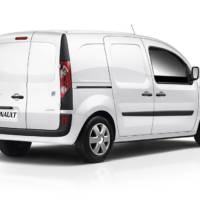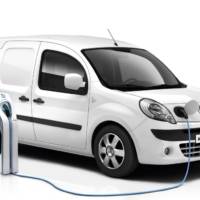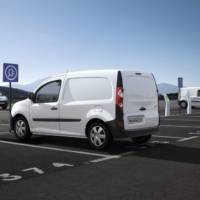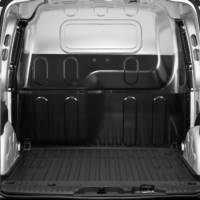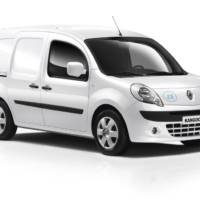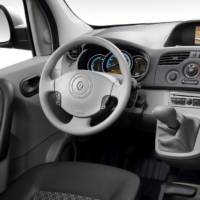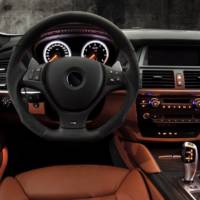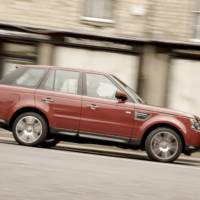The French automaker has announced the Renault Kangoo Express ZE price today, and customers can already start pre-ordering it at the www.renault-ze.com.
Measuring 4.21 m in length and with a load capacity between 3 and 3.5 cubic meters (650 Kg payload), the Renault Kangoo Express ZE features a 44 kW (60 hp) electric motor that is linked to a 22 kWh lithium-ion battery located in the center of the vehicle, under the floor.
This electric drivetrain enables the Renault Kangoo Express ZE to cover as much as 160 Km and recharging the vehicle can take between six and eight hours at any 220V 16A domestic socket.
The Renault Kangoo Express ZE price is between 15,000 Euro and 20,000 Euro depending on country and government tax incentives.
Features in the Renault Kangoo Express ZE are the same as in the regular petrol model, which means full bulkhead or
swivelling bulkhead incorporating folding passenger seat, hinged rear
roof flap, manual or automatic climate control plus audio with Bluetooth
connectivity.
Renault press release :
Renault has been the market leader in the LCV market in Western Europe since 1998.
· Renault has market share of 15.72% an increase of 1.3 points over August 2009.
· To consolidate its leadership, Renault launched three new models in 2010: Kangoo Express Maxi, New Trafic and New Master.
· The all-electric van, Kangoo Express Z.E., will expand the range in mid-2011. Depending on country, this vehicle, premiered at the Hanover International Commercial Vehicle Show, will cost between €15,000 excluding VAT (including a tax incentive subsidy of €5,000) and €20,000 excluding VAT (with no tax incentive deducted).
Since 1901 and the launch of its single-cylinder van, Renault has been a major player in LCVs vehicles. It has been the LCV market leader in Western Europe for the past 12 years, and even increased its market share this year, from 14.4% at end-August 2009 to 15.7% at end-August 2010.
Over the same period, Renault’s sales have increased by 20% in volume terms, in a market that has
grown by almost 10%.
This increase was driven primarily by the launch of three new models at the start of the year: New
Master, New Trafic and Kangoo Express Maxi. Renault’s LCV range now spans load volumes of between 2 and 22 m3, in order to meet all the needs expressed of business customers. KANGOO EXPRESS Z.E., THE ALL-ELECTRIC LCV AT €20,000 EXCLUDING VAT1
At the International Commercial Vehicle Show in Hanover, Renault is premiering the definitive version of Kangoo Express Z.E. (Zero Emission), the first all-electric van developed and built by a vehicle manufacturer.
Kangoo Express Z.E. will be sold in Europe at a price of €20,000 excluding VAT1, prior to any tax incentive that might be deductible. In France, for example, a state subsidy of €5,000 will reduce the
price of Renault Kangoo Express Z.E. down to €15,000 excluding VAT2, the same price as a Kangoo Express of identical diesel-engined power.
1 Excluding tax incentives, excluding options.
2 Available tax incentive deducted, excluding options.
Renault has developed several innovative purchasing concepts for its electric vehicle. Ownership of the vehicle will be separate to that of the battery. Customers will be able to purchase or lease their ZE van and take out a subscription for the battery costing from €72 excluding VAT per month.
‘Filling up’ on energy (160km) for Kangoo Express Z.E. will cost between one and two euros, depending on the local price of electricity (kWh). This marks a significant difference compared with an internal combustion-engined small van. Renault’s first electric vehicle will consequently be affordable both to buy and run, making it a particularly attractive proposition for business and fleet customers.
· Load capacities identical to internal combustion-engined version
Based on the Renault Kangoo Express, the electric van delivers zero-emission mobility1 for business
customers who care about environmental issues. It is designed to set high standards in durability and
reliability.
Renault Kangoo Express Z.E is 4.21m long with a load capacity of between 3 and 3.5 m3, a load
length of 2.50m and a payload of 650 kg. The batteries are located in the centre of the vehicle under
the floor, so load capacity is exactly the same as on the internal combustion-engined Kangoo Express. The asymmetric hinged rear doors and sliding slide door provide easy access to the cargo area, which is large enough to take a euro-pallet.
Customers will also have access to the same comprehensive range of professional equipment to
which they become accustomed with Kangoo Express: full bulkhead or swivelling bulkhead incorporating folding passenger seat, hinged rear roof flap, manual or automatic climate control and audio with Bluetooth connectivity.
The design of Renault Kangoo Express Z.E. is similar to that of the internal combustion-engined
version. A chrome ZE badge at the rear identifies it as a Renault electric vehicle. The charging flap is
located at the front of the vehicle, next to the right hand headlamp. A standard recharge via a 220V
16A domestic socket takes between six and eight hours when the vehicle is parked overnight or
during working hours.
Kangoo Express Z.E. has a range of 160 km over an NEDC combined cycle. Range management is
a key factor with electric vehicles, and Renault has taken steps to make it as straightforward and
efficient as possible. It has developed a special MMI (man machine interface) display to inform the
driver of the remaining battery charge and operational range:
– a gauge next to the speedometer shows the remaining battery charge,
– an econometer displays the level of energy consumption in real time,
1 During road use, excluding wear parts.
– the econometer uses a new colour code: light blue for “normal” use, dark blue for optimum
operation (energy recovery) and red for excessive consumption that will impact vehicle range,
– the onboard computer is tailored to the characteristics of electric vehicles. It shows the remaining
range and number of kWh, as well as real-time and average consumption.
New functions will also be available, such as pre-heating and pre-cooling during recharging, to
maximise vehicle range.
· An all-electric powertrain, improved driving pleasure
The electric van delivers a sound, reassuring and well-balanced ride while its dynamic qualities (roll
angles, steering input, etc.) are identical to those of the internal combustion-engined version. And
Kangoo Express Z.E. is even more enjoyable to drive: quiet, responsive and with no gear changes.
Acceleration is strong from low speeds and the motor delivers maximum torque of 226 Nm from the
moment the driver pulls away.
The electric motor has a power output of 44 kW (60 hp) and a maximum speed of 10,500 rpm.
Energy efficiency is 90%, far superior to the 25% of internal combustion engines. Low rolling
resistance tyres improve energy performance even further.
When the driver’s foot presses on the accelerator, the 22 kWh lithium-ion battery powers the electric
motor. The latter converts electrical energy into mechanical energy, transmitted to the drive wheels.
The battery recharges during deceleration phases, when the driver lifts his or her foot off the
accelerator pedal. The kinetic energy from the vehicle is recovered by the motor, which converts it
into electric current. The current generated in this way recharges the battery.
Renault Kangoo Express Z.E. will be available in nine solid or metallic body colours. Business
customers will be able to order vehicles in the corporate colors of their company.
The electric van will be produced in France at the Renault MCA (Maubeuge Carrosserie Automobile)
plant in Maubeuge, on the same production line as the internal combustion-engined version. It will
take full advantage of the first Kangoo’s production know-how, supplier fabric and logistics network.
This will make it possible to start production quickly as well as ensuring high quality standards from
the outset.
The first production electric van will be equipped with a unique range of equipment. Vehicles can be
pre-ordered from today on the website www.renault-ze.com. This preliminary order service gives
customers priority access to the vehicle when it arrives on the market.
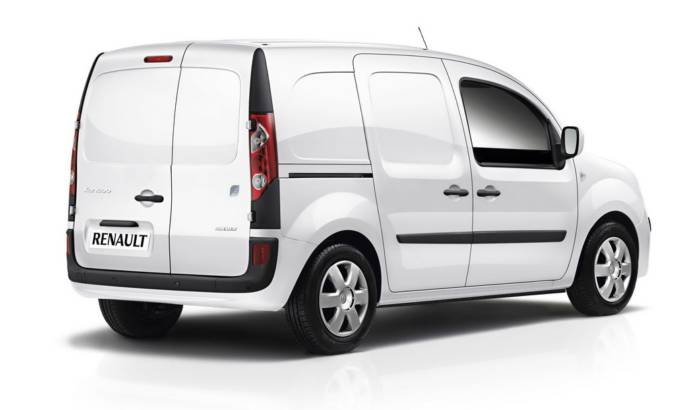
22 Sep 2010
0

